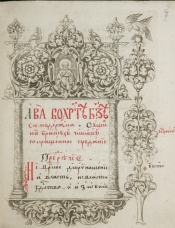
Books from library of Peter the Great featured in collection of Presidential Library
The Presidential Library's collection has been enriched with digital copies of rare books from the library of Peter the Great. These books were transferred by the Library of the Russian Academy of Sciences for digitization. Now, 22 of these old books are available for reading in the electronic reading room of the Presidential Library. These are both manuscripts and printed books in Russian.
The library of Peter the Great can be divided into two main parts. The first part consists of books that were inherited by Peter from his father, Tsar Alexei Mikhailovich, as well as books from his siblings. The second part comprises books that were ordered by Peter himself, including purchased editions and gifts.
The oldest edition of the Breviary dates back to the middle of the 16th century. The name of the book comes from the Old Russian word "требование" (trebovanie), which means "sacrifice", "offering", "prayer", and "performance of a holy rite". The book contains texts of so-called trebovanija - prayers and rituals performed by priests at the request of parishioners in special circumstances outside the annual cycle of church worship. These include prayer services, funerals, memorial services, house blessings, and other events.
The Garden of Extracts from the Bible, which was intended for "soulful reading", was compiled in the 17th century until 1676. This is a handwritten collection of sayings and various extracts extracted from the Holy Scriptures, the lives of saints, and other writings. The word "garden" serves as a decorative epithet, as the compiler of the collection likened himself to a hardworking bee collecting sweetness from various flowers - edifying thoughts, good advice, and teachings.
The publication The Life, Service, and Miracles of Zosima and Savvati Solovetskys tells the story of the founders of the Solovki Monastery, one of the most famous and respected monasteries in Russia. The paterik, or collection of texts, was published after tragic events associated with the Solovetsky Uprising of 1668-1676. This rebellion of monks who disagreed with church reforms led to a confrontation with government forces. The suppression of this schismatic uprising resulted in significant loss of life on both sides.
Ignatius Rimsky-Korsakov's report on his trip to Kostroma and Kineshevsky counties in 1687, written to exhort the schismatics, is devoted to the topic of church schism. Ignatius was the Metropolitan of Siberia and Tobolsk from 1692, the steward of Tsar Alexei Mikhailovich, and a writer and publicist. From 1676 to 1679, he founded the Solovetsky Monastery and oversaw the order of reading and singing in churches, that is, the worship according to the monastic charter. During this time, Ignatius also compiled the Solovetsky Irmologion, an Orthodox encyclopedia, for which he adapted the texts of newly revised liturgical books into musical notation.
The most frequently read book on the portal is A Guide to the Art of War, written by Leo VI the Wise, the Byzantine emperor, and translated from Greek by Fyodor Polikarpov in 1699. This is the emperor's own work.
Additionally, on the Presidential Library's portal, there is an opportunity to explore the electronic exhibition Library of Peter the Great. This exhibition was prepared in collaboration with the Library of the Russian Academy of Sciences and is available in the Exhibitions section. It presents many masterpieces of book art, such as one of the volumes of a front chronicle, a copy of the Radziwill Chronicle commissioned by Peter, and rare editions from the 16th to the first quarter of the 18th century in various languages, including maps and engravings.





